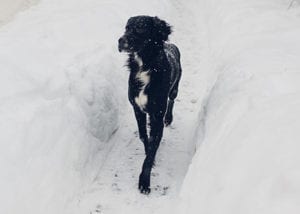Every year in the United States there are over 200,000 reported instances of pet poisoning. The majority of these come from common poisons for dogs found around the house and yard.
What are Some Poisons for Dogs that I Should be Aware of in North Charleston, SC?
Here’s a list of things to keep out of your dog’s reach.
Foods
There’s a lot of food that people enjoy that is unsafe for dogs to ingest.
 Chocolate
Chocolate
Commonly known to be poisonous to dogs, dark or baking chocolate is the most dangerous type for your pup to eat, however all kinds can be hazardous.
Xylitol
This is an artificial sweetener found in a lot of food and drinks, including some peanut butters. Be sure to read ingredients in anything you’re planning to feed your dog.
Grapes and Raisins
Scientists haven’t been able to determine what in grapes is toxic to dogs, but the fruit can cause kidney damage and even death.
Alcohol
It has the same effect on your pet’s brain and liver as it does on yours, but because of their size, even a small amount can be fatal. Avoid allowing your dog take even a quick taste of your alcoholic beverage as it can cause vomiting, diarrhea or worse.
Caffeine
This can cause cardiac arrythmia and increase your dog’s blood pressure.
Garlic, Onions and Shallots
These can cause damage to your dog’s red blood cells, causing anemia. If you like to cook with these, make sure to watch your pet and not allow him to lick your plate.
Medicines
NSAIDS
Non-steroidal anti-inflammatory drugs, such as ibuprofen, naproxen and aspirin are the most common medicines found around the home. While dogs can be given NSAIDs specifically developed for dogs to help with pain relief, they have a different mechanism of action. Drugs given to people should never be allowed within reach of dogs.
Tylenol can also be toxic to dogs are certain doses. It’s believed that decongestants in allergy medications can also cause issues with fast heart rates in dogs. Never give a human medication without consulting a veterinarian.
Antidepressants
Selective Serotonin Reuptake Inhibitors (SSRIs) can cause vomiting or serotonin syndrome, which raises temperature, heartrate, blood pressure and can even cause seizures.
Cleaners and Household Products
Ammonia
Found in many all-purpose, window and oven cleaners, ammonia causes possible eye damage and irritation to the skin. If ingested, ammonia can even cause death.
Chlorine
Used in bathroom and toilet cleaners, dishwashing and laundry detergents, and mildew removers, chlorine is a respiratory agent. Chlorine is heavier than air, so it sinks to the ground – right where your dog is.
Mothballs
Inhalation of mothball vapors over a long period of time can be fatal for dogs. Ingestion of even just one mothball could cause liver damage, seizures, heart arrythmia and respiratory failure.
 Winter Hazards
Winter Hazards
Deicers
Used often on icy sidewalks, ice melting agents contain a high sodium content. When your dog walks on these, his paws can become irritated and dry. It’s important to clean your dog’s feet off if he’s come into contact with deicers to avoid sodium toxicity.
Antifreeze
Nearly all anti-freeze compounds contain ethylene glycol which is DEADLY to dogs. Unfortunately, because of its sweet scent and taste, many dogs are drawn to it. Even small amounts can be deadly and unless treated immediately can lead to irreversible kidney damage or death.
Pest Control
Rodenticides
Rat or mouse poison can be just as harmful to your dog as it is to the rodents. They’re made to attract rodents, which also makes them palatable to dogs. Ingestion of rodenticides can cause organ failure, internal bleeding and death if not treated immediately by a veterinarian in North Charleston, SC.
Insecticides
Bug spray can be harmful if sprayed directly on the dog or if it’s ingested. Symptoms include diarrhea, drooling, nausea and vomiting. Insecticides used on plants contain chemicals that can cause respiratory arrest and seizures.
Slug and Snail Bait
These usually contain metaldehyde which is toxic and potentially lethal to dogs if ingested. It causes rapid onset of neurological symptoms and must be treated immediately.
Plants
Tomato Plants
The leaves and stems of a tomato plant contain solanine, which can cause intestinal upset, cardiac arrhythmia, weakness, tremors and seizures.
Daffodils
The popular springtime flower can be toxic if your dog eats the bulbs, stems, flowers or if she drinks water from a vase containing them. Daffodil poisoning causes upset stomach, vomiting and sleepiness.
Aloe Vera
Though great for burns, this succulent is toxic to dogs when ingested. A component in the plant, known as saponin, causes stomach problems, tremors, lethargy and central nervous system depression.
Oleander
The flowers, both fresh and dried, are toxic to dogs. Within thirty minutes of ingestion, oleander can cause gastrointestinal symptoms and cardiovascular or neurological issues.
Azaleas
Toxins found in these pretty flowering plants can cause vomiting, diarrhea, coma and death.
Weed Killer
Chemicals sprayed on lawns and gardens to kill off weeds in North Charleston, SC are active and can be toxic to your dog for up to forty-eight hours after application. After ingestion, symptoms will begin immediately and include vomiting, shivering, panting and difficulty breathing.
Sago Palms
These plants are more common in warmer climates. Every part of them is toxic to dogs. Even just a few seeds can lead to liver failure, seizures and death. Some dogs find the scent of them alluring, so it’s best to keep them away.
When in Doubt, Contact Your Vet in North Charleston, SC
If you think your pet has been poisoned by any of these common poisons for dogs, it’s important to call your veterinarian or poison control in North Charleston, SC immediately. If you’re instructed to come to the clinic, try to gather any remains of what you suspect has poisoned your dog so that your vet will have a good idea of what’s been ingested and how much. If your dog has vomited, bring a sample of that in for your vet as well. Your vet will likely want to run tests on your dog’s blood and other fluids.
In the event of poisoning, try to keep a clear head and not panic. The staff at Northwoods Veterinary Clinic is here to help you and your pet. Please contact us with any questions or concerns at (843) 553-0441.

 Chocolate
Chocolate Winter Hazards
Winter Hazards